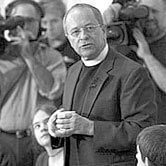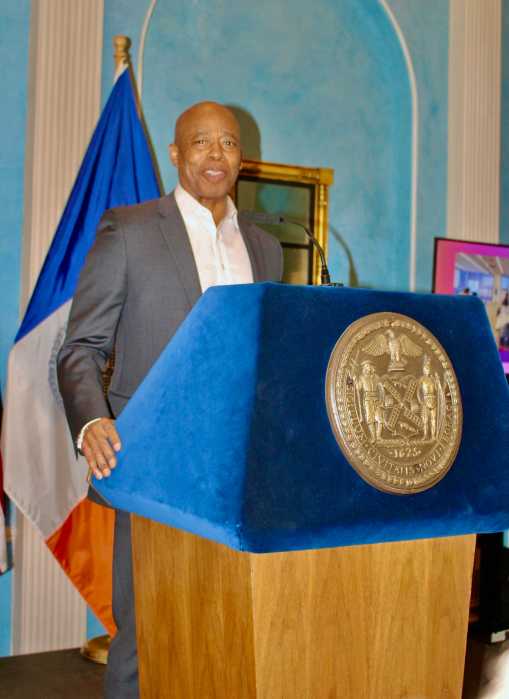Archbishop of Canterbury will meet with American gay canon
On October 19, Robinson told congregants at Grace Church in Manchester, New Hampshire, “I do have this sense that I am supposed to go forward and I do feel that it is coming from God and not my own ego. But I don’t know.” Earlier this year, British Canon Jeffrey John, an out gay man with a partner, was on the verge of being consecrated Bishop of Reading, England. John said that despite being in a relationship, he was not sexually active.
Despite Arhbishop Williams’ relatively liberal record on gay issues, when the crisis over John’s elevation erupted, Williams demanded a meeting with him at Lambeth Palace.
“Within 30 seconds of meeting Williams to discuss the issue,” the Guardian reported, “insiders say that John was forcefully told by the Archbishop, ‘This is not going to happen.’” According to observers, it took six more hours to draft a statement in which John agreed to withdraw.
That does not appear to be the course for Robinson. Because of threats to his safety, Robinson, 56, has been under police protection. According to the Guardian, some of the 38 primates, or national leaders, meeting in London last week told Williams that “in several countries there was considerable conflict and that supporting gay rights would provide yet another reason to attack Christians.” Whether or not that sort of scenario will be presented to Robinson to force him to withdraw remains to be seen.
Unlike the Catholic Church, which is centrally controlled, Williams lacks the power to order Robinson or the Episcopal Church in America to revoke Robinson’s elevation. Because of the loose ties that affiliate churches keep with the Anglican Communion, conservative leaders have the freedom not to recognize Robinson or the Episcopal Church in the U.S. if it goes through with what some are calling the “Satanic” act of consecrating an active homosexual as a bishop.
Last Thursday, 37 of the 38 primates, including Bishop Griswold, agreed to a statement on Robinson that warned, “If his consecration proceeds we recognize that we have reached a crucial and critical point in the life of the Anglican communion with the Episcopal Church.” Griswold, sitting next to Williams at a press conference, said, “The second coming could occur, but I am scheduled to be in New Hampshire on November 2. Something could happen to me, but I hope it will not.” The New Hampshire diocese that elected Robinson also issued a statement inviting doubters to come to their state and witness Robinson’s ministry. And the Rev. Mark Hopkins, past leader of Integrity, the LGBT Episcopalian group, told The New York Times, “He’s not going to back down. He knows too much is on the line.”
Complicating the controversy is the vehement opposition to Robinson’s consecration from African leaders, with the exception of the South African bishop. The Independent, a liberal UK paper, editorialized, “Political correctness forbids good liberals from saying so, but the assumption is the less well-educated Anglican communities in other parts of the world will in time jettison their visceral homophobia.” But Richard Ingrams, writing in the Observer, mocked this condescension, saying, “We are perhaps surprised not to be told, in addition, that some of these uncivilized bishops have only recently come down from the trees.”
The liberal Guardian editorialized, “The Church’s priority has to be to prevent schism, rather than accommodate society’s tolerance of homosexuality,” even while calling the anti-gay leaders “intolerant.”
Williams’ intended codification of common laws for the Anglican Communion has been sidelined by the current controversy. New York’s Bishop Mark Sisk, issued a rather vague statement saying, “Our faith calls us to seek unity, without demanding uniformity.” The Anglican Communion appears headed for a break-up over gay issues, with the American Episcopal Church even fracturing into more than one church. If Robinson stays the course and continues to seek the consecration that will officially elevate him as a bishop, those splits will come sooner rather than later.































